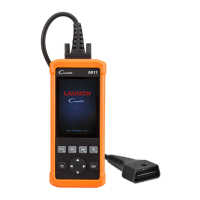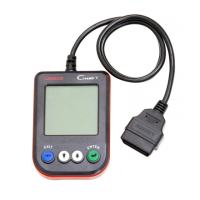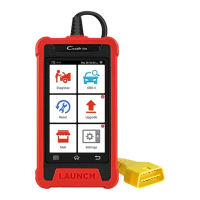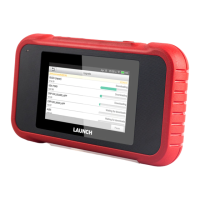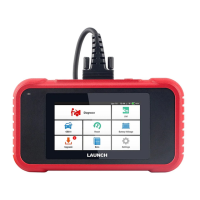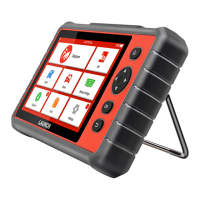LAUNCH 629 User's Manual
5
www.x431.com +86 755 8455 7891
• To standardize communication procedures and protocols between the
diagnostic equipment (Diagnostic Tools, Code Readers, etc.) and the
vehicle’s on-board computer.
2.3 Diagnostic Trouble Codes (DTCs)
OBD II Diagnostic Trouble Codes are codes that are stored by the on-board
computer diagnostic system in response to a problem found in the vehicle.
These codes identify a particular problem area and are intended to provide
you with a guide as to where a fault might be occurring within a vehicle. DO
NOT replace parts based only on DTCs without rst consulting the vehicle’s
service manual for proper testing procedures for that particular system, circuit
or component.
OBD II Diagnostic Trouble Codes consist of a ve-digit alphanumeric code.
• The 1st character is a letter (B, C, P or U). It identies the “main system”
where the fault occurred (Body, Chassis, Powertrain, or Network).
• The 2nd character is a numeric digit (0 thru 3). It identies the “type” of
code (Generic or Manufacturer-Specic).
Generic DTCs are codes that are used by all vehicle manufacturers. The
standards for generic DTCs, as well as their definitions, are set by the Society of
Automotive Engineers (SAE).
Manufacturer-Specific DTCs are codes that are controlled by the vehicle
manufacturers. The Federal Government does not require vehicle
manufacturers to go beyond the standardized generic DTCs in order to comply
with the new OBD II emissions standards. However, manufacturers are free
to expand beyond the standardized codes to make their systems easier to
diagnose.
• The 3rd character is a letter or a numeric digit (0 thru 9, A thru F). It
identies the specic system or sub-system where the problem is located.
• The 4th and 5th characters are letters or numeric digits (0 thru 9, A thru
F). They identify the section of the system that is malfunctioning.
